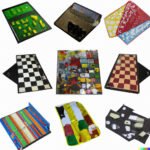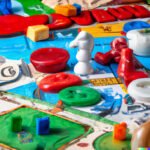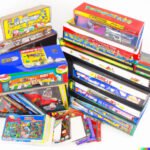Are you a fan of classic word board games? These timeless games have been entertaining and challenging players for decades, and their enduring popularity shows no signs of waning.
From the iconic Scrabble to the brain-teasing Boggle, word-based board games have a special place in the hearts of game enthusiasts. In this article, we will take a closer look at the history, top games, tips for winning, benefits, variations, and even options for kids when it comes to classic word board games.
As we delve into the world of classic word board games, we’ll explore their origins and evolution, as well as the most beloved titles that have captivated generations of players. Whether you’re a seasoned pro or just starting out on your word game journey, there’s something here for everyone.
Get ready to sharpen your vocabulary and strategic thinking skills with our expert advice on how to dominate in games like Scrabble, Boggle, and Upwords. Plus, we’ll also delve into the cognitive and social benefits of playing these classic word board games. So whether you’re looking for a fun family activity or simply want to challenge your friends to a battle of wits, classic word board games are always a good choice.
The History of Classic Word Board Games
Origins of Word Board Games
One of the earliest recorded word board games is Scrabble, which was invented in 1931 by architect Alfred Mosher Butts. However, the concept of creating words from a set of lettered tiles dates back even further. The game of Anagrams, for example, has been enjoyed for centuries and involves rearranging letters to form new words – a precursor to the word-building mechanics found in modern classics like Scrabble.
The Evolution of Word Board Games
Over time, classic word board games have continued to evolve with new iterations and variations. Games like Boggle introduced a timed element to word-building, challenging players to quickly form as many words as possible within a grid of lettered dice.
Upwords took a different approach by introducing a three-dimensional aspect to traditional word-building gameplay. As technology advanced, these classic word board games found new life in digital formats, allowing players to enjoy them on computers and mobile devices.
Influence on Modern Board Games
Classic word board games have also had a significant influence on modern board games beyond their specific genre. The concepts and mechanics introduced in these timeless favorites have inspired countless other games across different genres. Additionally, many contemporary game designers continue to draw inspiration from classic word board games when creating new titles, ensuring that their legacy remains an integral part of the gaming landscape for years to come.
The Top Classic Word Board Games
When it comes to classic word board games, there are several iconic and beloved titles that have stood the test of time. One such game is Scrabble, which was first introduced in 1938 and has since become a staple in many households around the world.
Scrabble challenges players to create words using letter tiles and strategically place them on a game board to earn points. With its simple yet addictive gameplay, Scrabble has become a timeless favorite for word game enthusiasts of all ages.
Another classic word board game that has captured the hearts of players for generations is Boggle. This fast-paced game tasks players with finding as many words as possible within a jumbled grid of letters before time runs out. The element of speed and the challenge of discovering new words make Boggle an exhilarating and engaging game for anyone who loves playing with words.
Upwords is yet another classic word board game that has garnered a dedicated fanbase since its release in 1981. Similar to Scrabble, Upwords requires players to create words using letter tiles, but with a unique twist – players can stack letters on top of existing words to change their meaning and earn more points. This innovative mechanic sets Upwords apart from other word games and adds an exciting layer of strategy to the gameplay.
These classic word board games have not only entertained countless individuals over the years but have also provided numerous cognitive benefits. From improving vocabulary and language skills to enhancing critical thinking and strategic planning, these games offer a fun way to exercise the mind while enjoying quality time with friends and family.
| Classic Word Board Game | Release Date |
|---|---|
| Scrabble | 1938 |
| Boggle | 1972 |
| Upwords | 1981 |
Tips and Strategies for Winning Classic Word Board Games
When it comes to classic word board games like Scrabble, Boggle, and Upwords, having the right tips and strategies can make all the difference in securing a win. Whether you’re a new player looking to improve or a seasoned veteran seeking an edge, these expert insights are sure to elevate your game.
Here are some expert tips and strategies for dominating in classic word board games:
1. Expand Your Vocabulary: The broader your vocabulary, the more options you have for forming high-scoring words. Make an effort to learn and memorize uncommon but high-value words that can give you an advantage during gameplay.
2. Master Two-letter Words: In games like Scrabble, knowing all the allowable two-letter words can be a game-changer. These short words can help you utilize spaces on the board efficiently and open up opportunities for longer, higher-scoring words.
3. Balance Defense with Offense: While it’s important to focus on maximizing your own point total, it’s equally crucial to prevent your opponents from scoring big points. Strategic placement of tiles and anticipation of potential plays by your opponent can help maintain control of the board.
4. Utilize Prefixes and Suffixes: Understanding common prefixes and suffixes can enable you to build off existing words on the board, creating multiple new words and maximizing your score.
By incorporating these tips into your gameplay, you can enhance your performance in classic word board games and increase your chances of emerging victorious. Whether you prefer the challenge of Scrabble’s strategic depth or the fast-paced excitement of Boggle, these expert strategies will help you become a force to be reckoned with at game night.
The Benefits of Playing Classic Word Board Games
Classic word board games offer a wide range of benefits for players, both young and old. From enhancing cognitive skills to promoting social interaction, these games have been proven to be more than just a source of entertainment. Let’s delve into the various advantages of playing classic word board games.
Cognitive Benefits
Playing classic word board games such as Scrabble and Boggle can significantly enhance cognitive skills such as vocabulary, spelling, and strategic thinking. These games require players to think critically, form words from jumbled letters, and make calculated moves to outsmart their opponents. Research has shown that regular engagement in word-based board games can improve language skills, memory retention, and problem-solving abilities.
Social Benefits
In addition to their cognitive advantages, classic word board games also promote social interaction and communication. These games provide an opportunity for friends and family to come together, engage in friendly competition, and bond over a shared love for wordplay. Whether it’s a heated game of Scrabble on a rainy day or a casual round of Upwords at a family gathering, these timeless classics bring people closer while fostering meaningful connections.
Educational Benefits for Children
For children, playing classic word board games can have significant educational benefits. Not only do these games help expand their vocabulary and linguistic skills, but they also teach valuable lessons about strategy, sportsmanship, and teamwork. Additionally, the competitive yet enjoyable nature of these games can motivate children to learn new words and improve their language abilities outside of the classroom. As a result, classic word board games serve as an effective tool for both learning and having fun simultaneously.
Overall, the cognitive, social, and educational benefits associated with classic word board games make them not only an enjoyable pastime but also an incredibly valuable asset in personal development. Whether played casually among friends or integrated into educational settings for children’s learning enrichment programs, these timeless classics continue to embody the perfect combination of entertainment and growth opportunities.
Variations and Modern Adaptations of Classic Word Board Games
When it comes to classic word board games, many traditional favorites have been given a modern twist to appeal to contemporary audiences. These new variations breathe fresh life into timeless games, making them even more enjoyable for players of all ages. Below are some examples of how classic word board games have been reimagined for the modern era:
- Scrabble: The classic word game has seen various adaptations over the years, including themed versions based on popular TV shows and movies. Additionally, digital versions of Scrabble now allow players to compete against friends and family online, adding a new level of convenience and accessibility.
- Boggle: This fast-paced word search game has been reinvented as Boggle With Friends, a mobile app that introduces new gameplay features and social elements. Players can now compete in real-time matches and connect with others from around the world.
Furthermore, some classic word board games have been reimagined as educational tools or integrated into virtual reality experiences, offering an immersive take on familiar games. These modern adaptations serve to capture the interest of tech-savvy audiences while preserving the fundamental appeal of traditional word-based board games.
Overall, the variations and modern adaptations of classic word board games cater to the evolving preferences and lifestyles of today’s players. By embracing new technologies and innovative ideas, these reimagined games ensure that the spirit of classic word play continues to thrive in the modern gaming landscape.
Word Board Games for Kids
Word board games are not just for adults – there are plenty of classic word board games that are perfect for children and families to enjoy together. These games are not only fun, but they also help kids develop important language and critical thinking skills.
One classic word board game that is perfect for kids is Scrabble Junior. This game features two different levels of play, so it can grow with your child as they develop their spelling and vocabulary skills. Another great option is Boggle Junior, which introduces younger children to the concept of creating words from letter cubes in a fun and engaging way.
For families looking for a cooperative word board game, there’s also “Outburst Junior”, where players work together to come up with as many words as possible related to a specific topic. This encourages teamwork and creative thinking while also building vocabulary.
| Classic Word Board Game | Age Range |
|---|---|
| Scrabble Junior | 5-8 years old |
| Boggle Junior | 3-6 years old |
| Outburst Junior | 7-12 years old |
These classic word board games provide an opportunity for children to have fun while also learning essential language skills. They promote literacy, critical thinking, and social interaction, making them an invaluable addition to any family game night. Whether you’re looking for a competitive game or a collaborative one, there’s a classic word board game out there that is perfect for you and your family to enjoy together.
The Future of Classic Word Board Games
In conclusion, classic word board games have proven to stand the test of time, with their enduring popularity and timeless appeal. From the origins and evolution of popular word-based board games to the expert tips and strategies for dominating in games like Scrabble, Boggle, and Upwords, these classic games continue to captivate players of all ages. Their cognitive and social benefits make them not only entertaining but also beneficial for personal development.
As we look towards the future of classic word board games, it is clear that these traditional favorites will continue to be cherished by many. However, there is also potential for innovations and modern adaptations to attract new players and keep the excitement alive. With advancements in technology and changes in gaming preferences, we can expect to see variations of classic word board games reimagined for contemporary audiences.
Whether it’s through updated versions or new twists on old classics, the enduring popularity of classic word board games ensures that they will always hold a special place in the hearts of game enthusiasts. As we await potential innovations in the world of word-based board games, one thing remains certain – these timeless favorites will continue to bring joy, laughter, and friendly competition to families and friends for generations to come.
Frequently Asked Questions
What Is the Most Popular Word Board Game?
The most popular word board game is Scrabble, which has been enjoyed by people of all ages for decades. It involves forming words using letter tiles and scoring points based on the letters used.
What Is a Popular Widely Played Word Game?
A popular widely played word game is Boggle, where players have to find as many words as possible within a grid of randomly assorted letters within a given time limit. It’s fast-paced and challenging.
What Is the Board Game With Words?
The board game with words that comes to mind is Upwords, where players stack letter tiles on top of each other to form new words or change existing ones. It adds a three-dimensional element to word-building games.

I love playing all kinds of games – from classics like Monopoly to modern favourites like Ticket to Ride.
I created this blog as a way to share my love of board games with others, and provide information on the latest releases and news in the industry.





